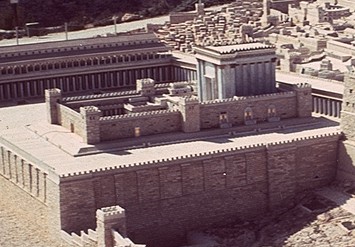|
The permanent sanctuary in Jerusalem where sacrifices were
offered.
|
 |
Replica of the Second Temple
|
The Law of Moses specified that there was to be one place for sacrifices
to be offered (Deut 12). While Israel sojourned in the wilderness,
the Tabernacle or Tent of Meeting served as the
center of worship. After David made Jerusalem the capital of the united kingdom
of Israel, he planned to establish a permanent Temple there, but was prevented
by the prophet Nathan (2 Sam 7:1-17).
The First Temple was built by David's son Solomon. The Temple was 90 feet long
and 30 feet wide. It had forecourt and an inner court, where the
Ark of the Covenant was housed (1 Kings 6).
Priests offered sacrifices each day on the altar at the Temple.
On Passover, the Feast of Weeks, and the Feast of Booths people made pilgrimages
to the Temple for worship. Many of the Psalms were composed for use
in the Temple. Some of the kings of Judah permitted people to worship at various
local shrines, but the reforms of kings Hezekiah and Josiah were intended
to make the Jerusalem Temple the single center for sacrificial worship.
The Temple was destroyed by the Babylonians
during their conquest of Jerusalem in 587 BC (2 Kings 25:9).
The Second Temple was built between 520 and 515 BC under
the leadership of Zerubbabel, Haggai,
and Zechariah. The design
was apparently similar to that of the First Temple, although the new building
was not as elegant as the old one had been. In the first century
BC, Herod the Great completely
rennovated the Temple, making it into a great and beautiful sanctuary
(Mark 13:1). Jesus expelled merchants and money changers
from the Temple and taught there prior to his crucifixion (Matt 21:12--24:1).
Jesus' followers continued to frequent the Temple after his resurrection
(Luke 24:53; Acts 3:1-26; 21:26). The Romans destroyed the Temple
in AD 70, and it was never rebuilt. Jewish worship continued in
homes and local synagogues.
|